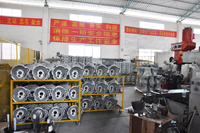Transmission principle
Structure of manual transmission
Manual transmission is a transmission that needs to change the transmission ratio by manually moving the transmission lever. Manual transmission is mainly composed of housing, transmission components (input and output shaft, gear, synchronizer, etc.) and operating components (shift rod, fork, etc.).
Operation principle of manual transmission
The operation principle of manual transmission is to switch the driving gear on the central shaft by moving the shift lever, and connect with the power output shaft through different gear combinations, so as to change the torque and speed of the driving wheel. Let's take a look at the structure diagram of the simplified manual transmission (second gear).

It is suggested that the power input shaft is directly connected with the power output shaft through a central shaft. As shown in the figure above, the two gears on the central shaft (red) and the two gears on the power take-off shaft (blue) roll with the output of the recommender. However, if there is no synchronizer (purple) engagement, the two gears (blue) can only rotate above the power output shaft (that is, the output shaft will not roll). The synchronizer in the picture is in the center state, which means that the transmission is in neutral.
Article from:http://www.wxtea.cc
-
07-10
Why can transmission change speed and what kind of transmission?
Why can the transmission change speed?Why can the gearbox adjust the output torque and speed of the machine? It's the principle of gears and levers. There are many different gears in the gearbox. Through the combination of gears of different sizes, the adjustment of torque and speed can
-
07-10
Causes of transmission shifting
Causes of transmission shift skipping defect:l) Due to the excessive wear of the gear teeth of the variable speed gear, gear sleeve or synchronizer cone, a rudiment is formed along the direction of the tooth length, and an axial thrust is generated when the gear is meshed, which is also affe
-
07-10
Three types of transmission
There are three common types of automatic transmission: at, CVT, AMT and DSG. At that time, at was widely used, and at almost became the pronoun of automatic transmission.At is composed of hydraulic torque converter, planetary gear and hydraulic operation system, which ends the variable spee
-
07-09
Causes of transmission gear wear
Transmission gear often works under the condition of high speed, high load and constant alternating speed and load. In addition to the normal wear and tear of gears, there are also reasons such as poor quality of lubricating oil, poor lubrication conditions, improper driving operation, improper